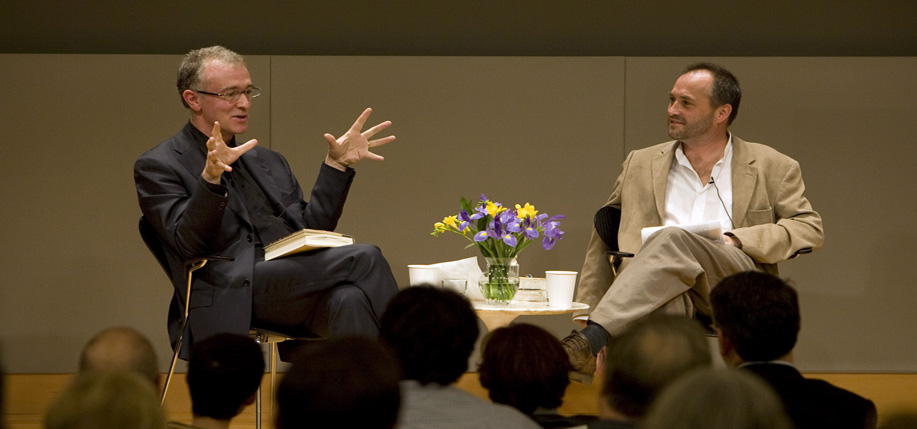Irish novelists Joseph O’Connor and Colum McCann enthralled an audience at the New York Public Library on November 14. As part of the fall program at the Dorothy and Lewis Cullman Center, O’Connor and McCann, both former Cullman Fellows, were there to discuss Redemption Falls, O’Connor’s novel about the American Civil War, an epic tale he wrote and researched during his Cullman Fellowship.
The bespectacled O’Connor chatted with McCann (the acclaimed author of Zoli, Dancer and This Side of Brightness) about the book, the craft of being a novelist, modern Ireland and the art of writing.
Doing his best James Lipton (Inside the Actors Studio) impersonation, McCann cajoled O’Connor into giving insights into his writing process. After reading an excerpt from Redemption Falls, O’Connor discussed the challenges and hurdles endured when writing historical novels, recounting humorous anecdotes of how there is always a reader with pen at the ready if any historical inaccuracy cropped up in his work.
On the modern Irish novel, O’Connor simply said, “There is no Irish Novel. Our generation of Irish novelists is not influenced by each other or by previous generations.” That said, he added that the current generation of Irish novelists is among the most interesting with writers like Colum Tobin, Roddy Doyle, Anne Enright, and Hugo Hamilton standouts.
Both O’Connor and McCann touched on the transformation Ireland has undergone in the past 15 years. O’Connor, who lives in Dublin, described the country of his youth. “The Ireland of today is not where we grew up. We were brought up to emigrate, the day you graduated you got a degree and a plane ticket. When I was in London in the 80s, I felt an overwhelming loneliness on returning to Ireland as I came home to a place where I knew no one.” He then contrasted the past to the country today. “Ireland has full employment but no big welcome. We’ve become multicultural very rapidly. Ten percent of our population and 17 percent of the workforce come from somewhere else. When my seven-year-old son grows up, there will be new languages, culture and belief systems. The preoccupations I had as a child will have disappeared. It’s already happening, so we had better get used to it.”
McCann echoed the theme, adding that Irish novelists now concentrate on subjects outside of Ireland (in O’Connor’s case the American Civil War and in McCann’s the tale of the Romany gypsies in Zoli) and argued that as Irish writers expand on exterior themes, the makeup and priorities of the Irish people were changing dramatically as sites such as the Hill of Tara, the ancient seat of Ireland’s High Kings, were about to be destroyed so highways could pass through. “We cannot go back to a country that doesn’t exist anymore,” said McCann.
O’Connor, who is a brother to singer Sinead O’Connor, also talked about his formative years and while describing himself as a bookish little fellow, admitted there weren’t too many books around the house. Two authors whose work was available were Benedict Kiely and John McGahern. Indeed, it was one of McGahern’s stories, “Sierra Leone,” which had a big effect on the 12-year-old O’Connor. The young Joe wrote out the story in a school notebook to feel what it would be like to write the words out on paper. Over the next few months he began to change the names of the characters, and alter the plot. Over time the fledgling writer kept bending and shaping the story until he came up with his own tale, “True Believers,” that would later be the title piece of a book of short
stories.
On adapting his work into film, O’Connor said he would not do the screenplay himself. He argued that a really good book cannot be adapted, simply for the reason that the writer chose the novel form to best tell his story. Plans are afoot for O’Connor to complete his historical trilogy (Star of the Sea was the first in the series) with a novel about Molly Allgood (the Abbey actress who was the love of writer J.M. Synge’s life) and after that he plans to write a contemporary novel. Of his future goals O’Connor said, “Learning to be a novelist is my greatest challenge.” He seems to be doing a good job so far.


Leave a Reply